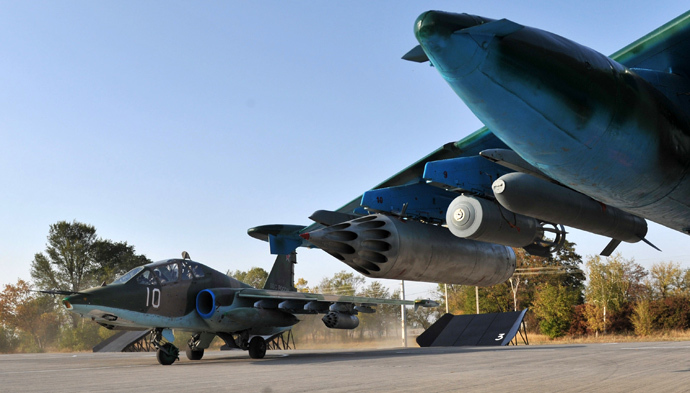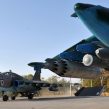
Russia to Double Aircraft at Kant Airfield in Kyrgyzstan
Publication: Eurasia Daily Monitor Volume: 10 Issue: 204
By:

According to General-Lieutenant Viktor Sevostianov, the commander of air forces in the Central Military District, which controls the Kant airbase in Kyrgyzstan, Russia plans to double the number of its aircraft there before the end of 2013 (https://argumenti.ru/army/2013/10/293863). Sevostianov made the announcement during an October 26 ceremony marking the base’s tenth anniversary (https://www.24kg.org/biznes-info/163844-oao-laquorosinbankraquo-partner-prazdnovaniya-10.html).
It is not clear what levels of equipment and personnel Russia currently maintains in Kant. According to Agence France-Presse and Russia Today (October 30), Kant presently has ten Sukhoi fighters, two Mi-8 helicopters and about a dozen other transport and training aircraft. Other Russian media reports state, however, that there are only five Su-25s, together with two Mi-8 helicopters stationed at the airbase (https://www.stanradar.com/news/full/5500-rossija-udvaivaet-prisutstvie-na-aviabaze-v-kyrgyzstane.html). Kant is manned by 400 Russian personnel and can also accommodate Russian Air Force transports, including the Ilyushin Il-76 “Candid” and Antonov An-22 “Cock” (https://www.janes.com/article/29170/russia-to-double-aircraft-at-kant-air-base).
The Russian Air Force acquired the Kant airbase on October 23, 2003, Moscow’s first such acquisition outside the Russian Federation since the collapse of Communism in December 1991. At the base’s inauguration ceremony, Russian President Vladimir Putin said that “the base will be a good deterrent for terrorists and extremists of all colors” (https://old.vko.ru/article.asp?pr_sign=archive.2005.23.123). Putin added, “Creating this coalition shield here in Kyrgyzstan, we intend to strengthen security in the region. The base will use combat aircraft in a complex mountainous terrain where ground forces are not always able to effectively counter the international gangs and drug trafficking.”
What Putin failed to mention was that the Kant airbase in effect became a competitor to the United States Department of Defense’s Manas Transit Center airbase near the Kyrgyz Republic’s capital of Bishkek, opened in December 2001 as part of the Pentagon’s Global War on Terror.
As Putin observed, Kant was established to support joint exercises of the Collective Rapid Reaction Force of the post-Soviet Collective Security Treaty Organization (CSTO) (https://www.redstar.ru/index.php/news-menu/v-armiyakh-sng/kyrgyzstanarmy/item/12244-aviabaza-kant-potentsial-rosta).
Kyrgyzstan sees the Russian presence as a powerful element in helping to stabilize the country’s fragile political security. On the role of the Russian airbase, Kyrgyzstan’s defense minister, Major General Taalaibek Omuraliev, explained the Russian presence in a March 26 interview with Krasnaya Zvezda: “Our country already has experience in the fight against illegal armed groups of Islamic extremists who invaded the Batken region of Kyrgyzstan in the summer of 1999. Then [Kyrgyzstan’s army] defeated the troops of the extremists. An attempt to destabilize the situation in the region failed. By the way, events in Batken and their threat of ongoing armed incursions by terrorists have stepped up joint efforts by CSTO forces to undertake decisive practical actions. As a result, in 2003 on our initiative, Russia received the Kant airbase. Destabilizing factors for the entire Central Asian region now include events taking place in Afghanistan. In connection with the planned withdrawal in 2014 of the International Security Assistance Force there will be an Islamic republic where the situation is unlikely to change for the better. Accordingly, the leadership of our country and the Ministry of Defense on the basis of the prevailing situation in the south of the country has drawn the appropriate conclusions” (https://www.redstar.ru/index.php/news-menu/v-armiyakh-sng/item/8244-v-pryamoj-uvyazke-s-sushchestvuyushchimi-ugrozami).
Russia’s relationship with Kyrgyzstan in providing common aid for internal terrorist threats is contrasted by the US presence at the Manas Transit Center, which was opened to assist US military operations in Afghanistan. For Washington, the Manas Transit Center airbase assumed increased importance following the US withdrawal in 2005 from the Karshi-Khanabad airbase in Uzbekistan. The US Embassy in Kyrgyzstan noted, “Since then it has hosted forces from Australia, Denmark, France, Italy, New Zealand, Norway, South Korea, Spain, the Netherlands, and the United States” (https://bishkek.usembassy.gov/topic-of-interest.html). With the US drawdown in Afghanistan scheduled to take place late next year, Kyrgyzstan’s government has made it clear to Washington that the Manas lease will not be renewed when it expires on July 11, 2014, unlike the political brinkmanship over the facility in the past. In June, the Kyrgyz parliament voted 91-5 to expel the US from the base, followed by a decree from President Almazbek Atambayev.
The Defense Department issued a terse press release on October 18, acknowledging Kyrgyzstan’s demands for the US to abandon Manas by July 2014 (https://www.defense.gov/releases/release.aspx?releaseid=16323). Subsequent US flights from Afghanistan will be rerouted through Romania’s Mihail Kogalniceanu airbase on the Black Sea, with aerial refueling flights to be mounted from an unnamed facility in Southwest Asia (https://www.stripes.com/news/dod-to-shift-air-transit-from-manas-to-romania-1.247953). Romania and Afghanistan are more than 2,300 miles apart, while the distance from Bishkek to Kabul is just 638 miles.
In contrast, Moscow has moved to solidify its presence in Kyrgyzstan. On August 16, 2012, the International Department head of Kyrgyzstan’s presidential administration, Saparmurat Isakov, told journalists that Russia would receive a new 15-year lease on the Kant airfield when the current contract expired in 2014, commenting: “The new agreement will take into account national interests,” adding that Russia had originally sought a 49-year lease (https://www.knews.kg/politics/20430_rossiyskaya_aviabaza_kant_ostanetsya_v_kyirgyizstane_na_15_let_vmesto_49/).
Moscow now intends to create a unified military presence in Kyrgyzstan, incorporating the Kant airbase along with its Dastan underwater weapons testing site in Karakol on Isskyk Kol lake, its military communications center in Kara-Balta and a radio-seismic laboratory in Mayly-Suu (https://vesti.kg/index.php?option=com_k2&view=item&id=23706:rossiya-reshila-uvelichit-vdvoe-chislo-samoletov-na-aviabaze-v-kyirgyizstane&Itemid=83). The idea of creating a unified military command was first discussed in 2009 (https://vesti.kg/index.php?option=com_k2&view=item&id=23706:rossiya-reshila-uvelichit-vdvoe-chislo-samoletov-na-aviabaze-v-kyirgyizstane&Itemid=83&tmpl=component&print=1). Russia has now begun planning to remodel its airbase, overhauling the runways to be able to receive strategic bombers (https://polit.ru/news/2013/04/17/air/).
Russia portrays its presence in Kyrgyzstan as justified by both Moscow and Bishkek’s joint membership in the CTSO and Shanghai Cooperation Organization. CSTO members are worried about the potential for both increased drug trafficking and terrorism flowing out of Afghanistan following the withdrawal of ISAF forces in 2014, which has greatly increased the potential role of the Kant airbase. Accordingly, on September 20, Kyrgyzstan held anti-drug exercises code-named “Thunder 2013” and “Ala-Too-Anti-Terror 2013” (https://topwar.ru/35203-aviabaza-kant-potencial-rosta.html).
Simply put, Moscow outbid Washington. In September 2012, Putin visited Kyrgyzstan and met with Atambayev. Besides signing a lease extension on Russian military facilities in Kyrgyzstan, the two sides also signed accords canceling a $190 million Kyrgyz debt to Russia and restructuring another $300 million loan dating from 2009 (https://www.newsru.com/world/20sep2012/kyrgyzbase.html).
But Russia’s larger strategic goals for retaining its presence at the Kant base may extend beyond drug control and countering extremism. Writing seven years ago in the journal Nezavisimaiia Gazeta, author Igor Plugatarev entitled his article, “The ‘Kant’ airbase and control of the whole of Central Asia” (https://nvo.ng.ru/forces/2005-09-30/1_kant.html). It would seem that Kyrgyzstan’s government has decided that securing Russia’s assistance in quelling internal instability is more important than assisting international efforts in Afghanistan. Only time will tell whether the choice was a wise one.




